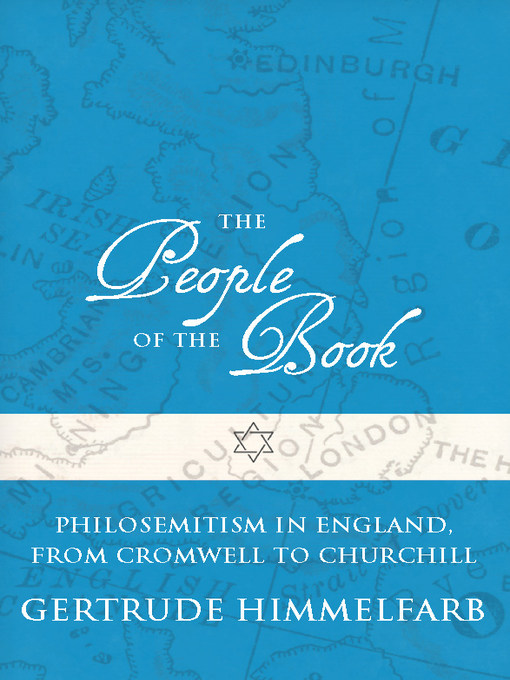- New eBook additions
- All About Education
- Cozy ebooks for Fall
- Made in West Virginia
- A Shore Thing
- First in the series
- Strange New Worlds
- Worlds of Fantasy
- Most popular
- Available now
- Try something different
- Just Plain Good
- See all ebooks collections
The People of the Book
Philosemitism in England, From Cromwell to Churchill
There is a poetic justice – or historic justice – in the fact that England, the first country to expel the Jews in medieval times, has produced the richest literature of philosemitism in modern times.
From Cromwell supporting the readmission of the Jews in the 17th century, to Macaulay arguing for the admission of Jews as Members of Parliament in the 19th century, to Churchill urging the recognition of the state of Israel in the 20th, some of England's most eminent writers and statesmen have paid tribute to Jews and Judaism. Their speeches and writing are powerfully resonant today. As are novels by Walter Scott, Disraeli, and George Eliot, which anticipate Zionism well before the emergence of that movement and look forward to the state of Israel, not as a refuge for the persecuted, but as a "homeland" rooted in Jewish history.
A recent history of antisemitism in England regretfully observes that English philosemitism is "a past glory." This book may recall England – and not only England – to that past glory and inspire other countries to emulate it. It may also reaffirm Jews in their own faith and aspirations.
-
Creators
-
Publisher
-
Release date
November 8, 2011 -
Formats
-
Kindle Book
-
OverDrive Read
- ISBN: 9781594035715
-
EPUB ebook
- ISBN: 9781594035715
- File size: 618 KB
-
-
Languages
- English
-
Reviews
-
Publisher's Weekly
September 26, 2011
Historian and professor emeritus Himmelfarb (The Jewish Odyssey of George Eliot) presents a compelling counter-story to the popular topic of anti-Semitism by focusing on philosemitism, an ambiguous term that is used here to describe England’s historical high regard for Jews and Judaism. This brief yet ambitious social-historical essay highlights the central ideas and events in the history of English philosemitism, from the readmission of the Jews to England in the 17th century (after their expulsion in 1290), to Macaulay arguing for the admission of Jews as members of parliament in the 19th century, through the establishment of the state of Israel in the 20th. Himmelfarb explains that, long before the Holocaust, Zionism and the return of Jews to Israel (then known as Palestine) inspired Christians as well as Jews. In the case of Lord Balfour, Himmelfarb writes, his commitment to Zionism grew out of his immersion in the Old Testament and Jewish philosophy. She concludes her analysis with a discussion of Winston Churchill’s admiration for Jews and Judaism and explains how his advocacy helped foster the creation of the Jewish state. An erudite appraisal of novels by Walter Scott, Benjamin Disraeli, and George Eliot adds a literary context to this fascinating and often overlooked history.
-
Loading
Why is availability limited?
×Availability can change throughout the month based on the library's budget. You can still place a hold on the title, and your hold will be automatically filled as soon as the title is available again.
The Kindle Book format for this title is not supported on:
×Read-along ebook
×The OverDrive Read format of this ebook has professional narration that plays while you read in your browser. Learn more here.

